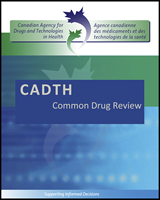Except where otherwise noted, this work is distributed under the terms of a Creative Commons Attribution-NonCommercial-NoDerivatives 4.0 International licence (CC BY-NC-ND), a copy of which is available at http://creativecommons.org/licenses/by-nc-nd/4.0/
NCBI Bookshelf. A service of the National Library of Medicine, National Institutes of Health.
Entyvio (Vedolizumab) [Internet]. Ottawa (ON): Canadian Agency for Drugs and Technologies in Health; 2016 Dec.
Three phase 3, placebo-controlled, double-blind randomized controlled trials investigated the effects of vedolizumab on treatment induction (GEMINI II and GEMINI III) or maintenance (GEMINI II) in patients with moderate to severe Crohn’s disease. Clinical remission was defined as a CDAI ≤ 150. Regulatory agencies and the clinical expert consulted by CDR noted that the definition of clinical remission was reflective of a clinically meaning improvement.
Patients who received vedolizumab were more likely to achieve clinical remission at six weeks than those who were treated with placebo in both GEMINI II and GEMINI III. The proportion of vedolizumab-treated patients who achieved clinical remission was greater at 10 weeks compared with that at six weeks in GEMINI III. In the subpopulation of patients who had previously failed treatment with at least one TNF alpha antagonist, treatment with vedolizumab was not associated with a statistically significant difference compared with placebo for inducing clinical remission at six weeks in either GEMINI II or GEMINI III, but a greater proportion of vedolizumab-treated patients in this subgroup did achieve clinical remission compared with placebo at 10 weeks in GEMINI III. The proportion of patients with an enhanced clinical response (defined as an improvement of at least 100 in CDAI) was greater at six and 10 weeks in GEMINI III, but there was no such difference versus placebo at six weeks in GEMINI II. In the maintenance phase of GEMINI II, a greater proportion of vedolizumab-treated patients demonstrated clinical remission and corticosteroid-free clinical remission at 52 weeks compared with placebo in both the overall population as well as the subpopulation of patients who had previously failed treatment with at least one TNF alpha antagonist. Compared with placebo-treated patients, a greater proportion of vedolizumab-treated patients demonstrated enhanced clinical response at 52 weeks in GEMINI II in the overall population, but not in the TNF alpha antagonist-failure population. Vedolizumab-treated patients demonstrated greater improvements from baseline in the IBDQ, SF-36, EQ-5D, and EQ-5D VAS, although it is not known whether these differences were statistically significant. The improvement in EQ-5D VAS exceeded the published MCID, whereas the improvements in SF-36 and IBDQ did not. The included studies were not designed to investigate the efficacy of vedolizumab for mucosal healing or reducing the need for surgical intervention and efficacy end points.
The proportion of patients who experienced at least one adverse event or serious adverse event or who discontinued due to an adverse event was similar between the vedolizumab and placebo groups across all of the included studies. Nasopharyngitis, back pain, and fatigue were more frequently reported in vedolizumab-treated patients compared with placebo-treated patients, but these did not lead to discontinuation of treatment. Infusion-related reactions were relatively rare and occurred at a similar frequency in the placebo and vedolizumab groups.
There were no studies in which vedolizumab has been compared directly against the TNF alpha antagonists, adalimumab and infliximab, for induction or maintenance treatment of Crohn’s disease. Five indirect comparisons reviewed by CDR included comparisons of vedolizumab against other biologic treatment for Crohn’s disease. However, each of these comparisons was limited by substantial heterogeneity associated with the study designs and patient characteristics of the studies included in the indirect comparisons, which precluded any definitive conclusions regarding the comparative efficacy and safety of vedolizumab compared with TNF alpha antagonists.
- CONCLUSIONS - Entyvio (Vedolizumab)CONCLUSIONS - Entyvio (Vedolizumab)
- SemiconsciousSemiconsciousMedGen
- Chromosome neighbors for GEO Profiles (Select 9084805) (20)GEO Profiles
Your browsing activity is empty.
Activity recording is turned off.
See more...
